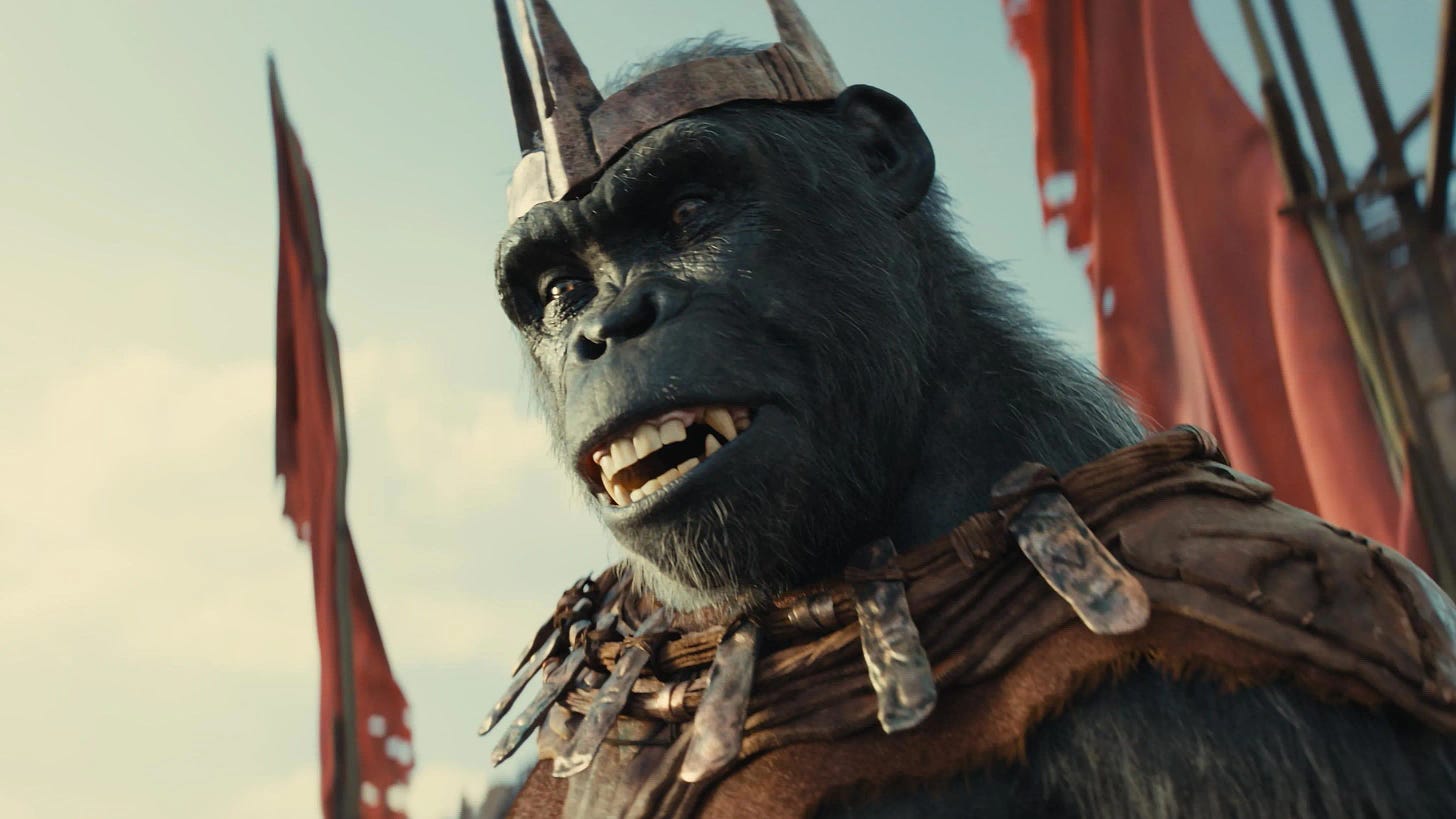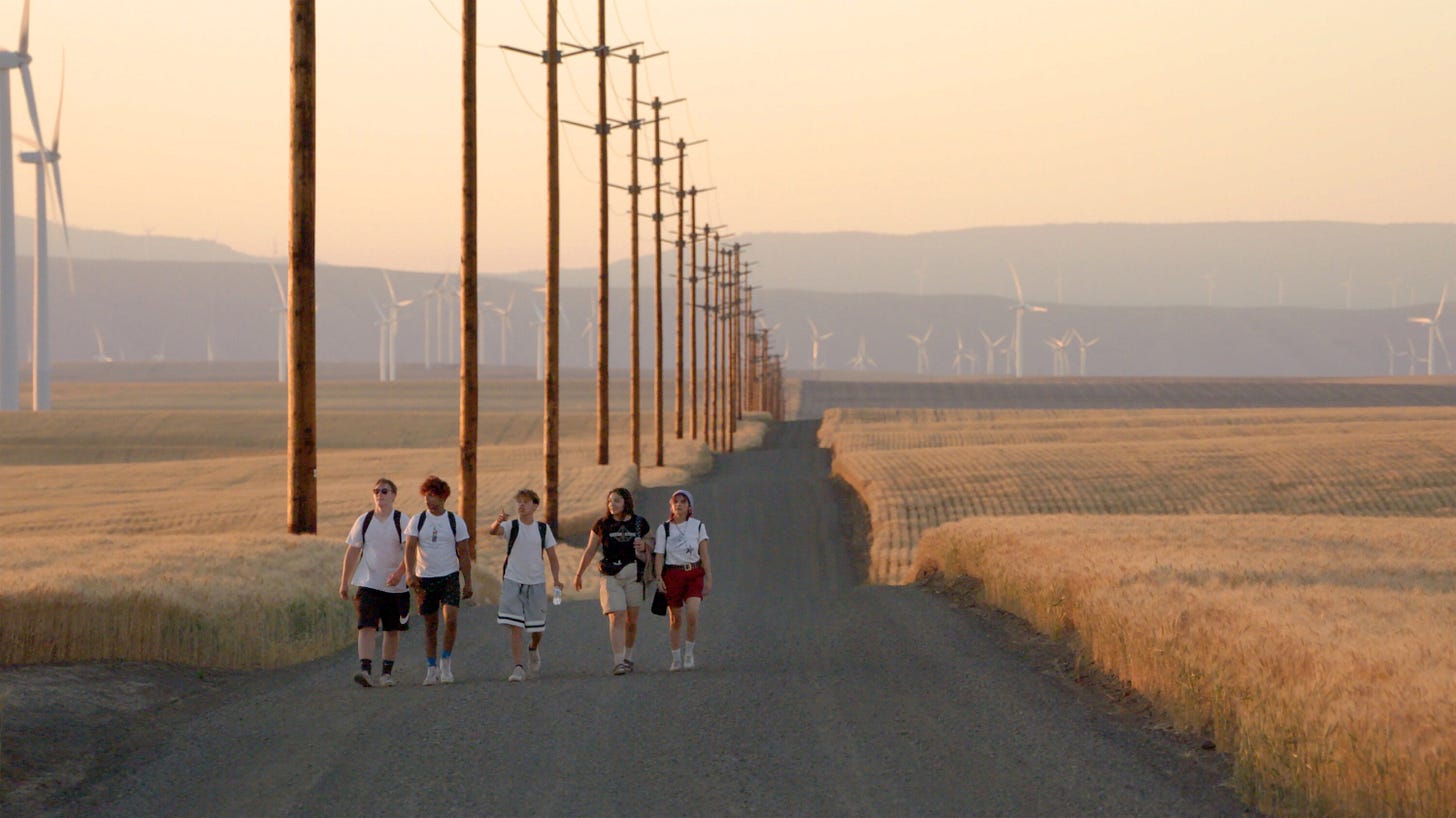In Review: 'Kingdom of the Planet of the Apes,' 'Gasoline Rainbow'
The Planet of the Apes begins a new cycle while a filmmaking brother act continues to blur the line between fact and fiction.
Kingdom of the Planet of the Apes
Dir. Wes Ball
145 min.
When last we saw the Planet of the Apes (a.k.a. Earth, sorry for the 56-year-old spoiler), things weren’t looking so great for humanity but considerably more promising for the apes. The apes, led by the messianic Caesar, sought refuge and a place to call their own after surviving the eponymous war of War for the Planet of the Apes while the humans started to revert back to a feral, preverbal state thanks to previously unknown effects of the Simian Flu that made apes intelligent in the first place. Kingdom of the Planet of the Apes picks up the story “many generations” after the events of that film, opening in a remote corner of its ape-dominated world where a small band of chimps leads a seemingly peaceful existence in a small village built around the raising and training of birds of prey.
Though seemingly stalled out in the hunter-gatherer phase of civilization, Eagle Clan life seems pretty satisfying. It’s also, as soon becomes apparent to our hero Noa (Owen Teague), pretty fragile, due to some troubling encounters with a young human he’ll come to call, per ape tradition, Nova (Freya Allen) and the even more troubling discovery of a band of armed, mask-wearing apes from another clan. Thanks in part to an unwitting Noa, the outsiders burn Eagle Clan’s village to the ground, kidnap the survivors, and leave Noa for dead. This prompts a perilous road trip in which he picks up two companions: a soulful orangutan named Raka (Peter Macon) and, to the surprise of both, Nova.
Working from a script by Josh Friedman, director Wes Ball (best known for the Maze Runner films) uses Kingdom to carve out space for another Apes cycle. That task starts to undermine Kingdom’s ability to stand on its own two feet—or, maybe more accurately, four prehensile appendages—in a final act filled with rushed world-building, some of which feels a little rickety upon close scrutiny. From the first moment Charlton Heston fled a bunch of ape hunters on horseback, the Apes films have attempted to strike a balance between delivering the action goods and exploring philosophical questions about the nature of humanity,using the ape world to reflect our own times. Kingdom introduces a bunch of intriguing elements early on, particularly the notion that Caesar’s teachings have been interpreted differently in various parts of the ape world, and sometimes twisted to self-serving ends. It also features a villain, the dictatorial Proximus (Kevin Durand), who’s more morally ambiguous than he first appears, particularly in light of some late-film revelations. Yet the film never seems all that interested in getting beneath the surface of these ideas. Simply acknowledging they exist seems like all the thematic work Kingdom is willing to do.
As a blockbuster driven by memorable action scenes and compelling characters, however, it works quite well, particularly in a middle stretch that sends Noa and his companions on a journey through landscapes almost but not quite devoid of evidence that humans lived. The effects, overseen by series veteran Erik Winquist, are as impressive as ever. (We’re now at a point where the ability to create convincing non-human characters via motion capture is taken for granted, in part because they’re so well-done it’s easy to forget they’re effects at all.) If it all feels less thought-provoking and surprising than its three predecessors, Kingdom is still a solid entry in what’s, in both its original and new flavor variations, one of the most reliable film series around. (It’s best just to forget Tim Burton’s attempt.) But it’s also the first of the recent Apes to play less like its own film built around particular concerns and questions than an installment driven by the obligations of a franchise. With the foundation laid, hopefully any follow-ups can find ways to build upon it, maybe even creating something we haven’t seen before. —Keith Phipps
Kingdom of the Planet of the Apes is in theaters today.
Gasoline Rainbow
Dir. Bill Ross IV, Turner Ross
110 min.
At this point, it’s become impossible to talk about the films of Bill and Turner Ross without discussing the parameters first, because the typical fiction/documentary binary doesn’t apply. The whole messy conversation came to a head when the Rosses last film, Bloody Nose, Empty Pockets, earned a documentary competition slot at the 2020 Sundance Film Festival, even though its evocative scenario about the last night at a dive bar in Las Vegas was actually staged at a bar in Terrytown, Louisiana and the interactions between its subjects were a form of improvised performance. The Rosses are obviously unbound by the journalistic ethos of nonfiction—however sketchy that notion of truth gets defined—but their filmmaking style naturally raises questions about what’s “real” or whether it’s even worth getting hung up on the issue.
To an extent, the Rosses’ new film, Gasoline Rainbow, feels like a companion piece to Bloody Nose, Empty Pockets: Both are journeys to the horizon—closing time for a bar in one, a trip to an “end of the world” in the other—but where Bloody Nose sidles up to aging barflies in an intimate space, Gasoline Rainbow follows misfit teenagers anxious to explore the American landscape, or at least the varied topography of Oregon as it leads to the Pacific Ocean. Perhaps the best way to understand the film, and much of the Rosses’ work in general, is as a fiction that rings of truth, which is really what most dramas are trying to achieve whether they’re wholly scripted or not.
The first lie here is that the quintet of adolescent stars—Tony Abuerto, Micah Bunch, Nichole Dukes, Nathaly Garcia, and Makai Garza, all performing and reacting to scenarios under their own names—are from the inland town of Wiley, Oregon, 513 miles from the ocean. Wiley quite literally does not appear on any map because it’s as nonexistent as the high school ID badges that introduce these characters, but it’s fair to accept the broad premise of these Zoomers piling into a beat-up van and striking out on a grand adventure, vaguely hoping to make it to the coast. None of the friends are worldly, but they share the sense that they don’t belong in small-town Oregon and this trip is an opportunity to find themselves in the grand tradition of American road adventures, from Jack Kerouac to Harold & Kumar Go to White Castle.
With a vehicle that nearly craps out on the way out of town and a budget that prioritizes weed over food, gas, and lodging, the group doesn’t have much of an itinerary or a margin for error. That might sound scary, but Gasoline Rainbow emphasizes the importance of spontaneity and discovery for young people still looking for their place in the world. The one nagging problem with the film is that the Rosses open themselves up to Great American clichés, such as the self-mythologizing of characters who say things like, “As soon as we hit that highway, driving away from it all, it felt like my new beginning was coming.” When lines like that are paired with the Rosses’ gorgeous magic-hour images, the film can feel too aestheticized.
The saving grace here is that Gasoline Rainbow is frequently hilarious, like a particularly authentic stoner comedy. Discussing what it must have been like for Neil Armstrong to readjust to normal life after being in outer space, one of them asks, “How does that feel? You’re shitting in the air and you come home and now you’re shitting in the toilet.” When an older skateboarder they meet in Portland likens himself to Patrick Stewart, another kid wonders, “Patrick Stewart? Isn’t he like an old famous dude?” Amid the rollicking good times, the Rosses do pick up on troubling reflections, like families broken by deportation and divorce, or one roadside stranger who figures he’ll join the military, because there’s no other viable option for him. Gasoline Rainbow doesn’t fill you with optimism about its travelers’ futures, either, at least not in the most conventional sense of something settled and secure. But it celebrates their impulse to go off the grid and find themselves. As one young woman says here, “To me, home is everywhere but it’s also nowhere.” — Scott Tobias
Gasoline Rainbow opens in limited release tomorrow.









Would have been much cooler if the villain was played by Kevin Durant